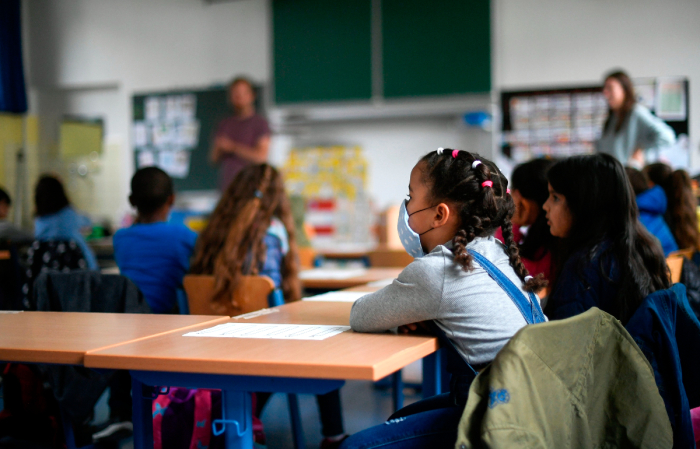'Nation's Report Card' records significant decline in math, reading scores after pandemic closures

Student reading and math scores suffered significant declines in the past three years as the nation analyzes the impact the COVID-pandemic had on education, according to The National Assessment of Educational Progress.
The congressionally-mandated NAEP, also known as the "nation's report card," released Monday suggests dramatic declines in math and reading levels for fourth and eighth graders. Math scores showed the largest drop since NAEP began administering tests in 1990, and reading scores declined in both grade levels since the pandemic.
The average reading scores for both grades decreased by three points since 2019, before COVID forced schools to enact remote learning measures. Similarly, the average math scores for fourth and eighth grade declined by five and eight points, respectively.
Most states saw scores decline for fourth and eighth-grade math and reading between 2019 and 2022.
Overseen by the U.S. Department of Education, the study assessed over 400,000 students at over 10,000 schools across the country at the beginning of the year, scoring students on a scale of zero to 500.
U.S. Secretary of Education Miguel Cardona said the findings in the report are "appalling and unacceptable."
"This is a moment of truth for education," he said during a call with reporters Monday. "How we respond to this will determine not only our recovery, but our nation's standing in the world."
Peggy Carr, the commissioner for the National Center for Education Statistics, said the drop in math was to be expected in light of the nationwide pause to in-person learning during the pandemic.
"We really need the teachers to teach math," Carr said. "Reading, on the other hand, is something that parents and communities are more comfortable helping students with."
Nicole Neily, president of the advocacy group Parents Defending Education, believes that the report proves American parents' concerns about their children's education during the pandemic correct.
"American students were the subject of a years-long social experiment that will impact our country's economy for decades to come," Neily wrote in a Monday statement shared with The Christian Post.
"It's time to hold the education bureaucrats, activists, and public health officials who mocked, shamed, and derided families accountable for their decisions — and refuse to cede them any further authority (or funds) going forward."
The group's director of outreach, Erika Sanzi, agrees with Carr that the academic outcomes for students were "predictable."
"We knew prolonged school closures and masking would have catastrophic effects on children," she stated. "And now we have more evidence that they did."
Last month, NAEP released the results of an assessment that found historic declines in reading and math scores for 9-year-old students. The scales used in the evaluation also ranged from zero to 500, with the group testing around 7,400 students from 410 schools from January to March 2020 and 2022.
"Average scores for age 9 students in 2022 declined 5 points in reading and 7 points in mathematics compared to 2020," the report stated. "This is the largest average score decline in reading since 1990, and the first ever score decline in mathematics."
The assessment noted that declines in math scores differed by race, with black students experiencing a 13-point score decrease compared to a 5-point decrease among white students. According to the report, the score gap between the two races went from 25 points in 2020 to 33 points in 2022.
City students, who previously scored 213 on average in reading and 236 in math in 2020, experienced a seven-point decline in 2022. Students in suburban schools, who once scored 225 in reading in 2020, saw their scores decline by 8 points in 2022. Math scores for the same group of students went from 245 in 2020 to 236 in 2022.
Carr said in an August statement that COVID-19 may have "exacerbated" learning challenges already existing, particularly for students already underperforming.
"There's been much speculation about how shuttered schools and interrupted learning may have affected students' opportunities to learn," Carr wrote.
"Our own data reveal the pandemic's toll on education in other ways, including increases in students seeking mental health services, absenteeism, school violence and disruption, cyberbullying, and nationwide teacher and staff shortages."
A study released in July by the National Center for Education Statistics indicates the pandemic may have also impacted student behavior. The agency collected data from 846 participating schools between May 10 and May 24 as part of its School Pulse Panel.
According to the study, 87% of public schools reported the pandemic negatively impacted students' socio-emotional development for the 2021-2022 school year. Eighty-three percent of public schools also agree that the pandemic negatively affected students' behavioral development.
Forty-eight percent reported an increase in disrespect towards teachers and staff, and 56% noted an increase in student misconduct in the classroom. Forty-nine percent saw a rise in rowdiness outside the classroom, and 42% experienced increased use of prohibited electronics in class.
Samantha Kamman is a reporter for The Christian Post. She can be reached at: samantha.kamman@christianpost.com.





























